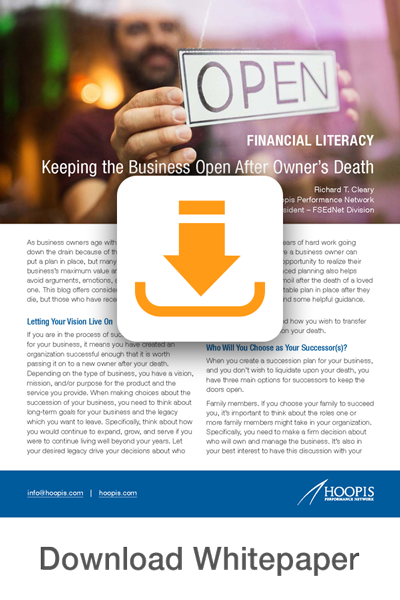Keeping the Business Open After Owner’s Death

As business owners age without a plan for their business when they die, they risk years of hard work going down the drain because of their departure. Sometimes tragic accidents occur before a business owner can put a plan in place, but many times advanced planning gives business owners the opportunity to realize their business’s maximum value and develop a plan for those who succeed them. Advanced planning also helps avoid arguments, emotions, and feelings which can lead to family and business turmoil after the death of a loved one. This blog offers considerations for business owners who want to put an executable plan in place after they die, but those who have recently inherited a business from a loved one might also find some helpful guidance.
Letting Your Vision Live On
If you are in the process of succession planning for your business, it means you have created an organization successful enough that it is worth passing it on to a new owner after your death. Depending on the type of business, you have a vision, mission, and/or purpose for the product and the service you provide. When making choices about the succession of your business, you need to think about long-term goals for your business and the legacy which you want to leave. Specifically, think about how you would continue to expand, grow, and serve if you were to continue living well beyond your years. Let your desired legacy drive your decisions about who your successor will be and how you wish to transfer the business to them upon your death.
Who Will You Choose as Your Successor(s)?
When you create a succession plan for your business, and you don’t wish to liquidate upon your death, you have three main options for successors to keep the doors open.
Family members. If you choose your family to succeed you, it’s important to think about the roles one or more family members might take in your organization. Specifically, you need to make a firm decision about who will own and manage the business. It’s also in your best interest to have this discussion with your family long before your death, especially if multiple family members are involved in the business or want to be upon your death. Managing expectations will curtail any hard feelings and emotions which sometimes accompany the mixture of family and business. If more than one family member will own the business, you also need to determine the split of ownership. What percentage of the business will each owner have?
Co-owners. You might already have co-owners with whom you started and operated your company. A succession plan might include your estate selling your interest to non-family co-owners, who will carry on the vision you started together. In other cases, you might choose for a family member to take control of your interest and share the business with already existing owners. It’s crucial for you to discuss these plans with your current business partners to ensure they have no reservations about your succession plans. If disagreement and turmoil occurs as a result of your decisions, you risk damaging the longevity of your business.
Third-party buyer. Selling to a third-party buyer upon your death is the riskiest move you can make if you want to see your business continue to thrive upon your departure. Yet, if you are the sole owner and you have no family to take over or monitor your interests, you might be forced to take the gamble and sell to a third-party buyer when you die. This doesn’t stop the buyer from eventually liquidating the business, but if you plan far enough ahead and find the right person, you have a good chance of finding someone who wants to carry on with your vision for the future.
Transferring the Business After Death
Once you decide on who will succeed you in your business after your death, you need to arrange how you wish to transfer the ownership of your business. Keep in mind that each option has different financial, legal and tax consequences for the new owner(s), your business, and your estate, so it’s imperative you discuss your plan with a trusted financial planner and attorney who has experience in this type of succession and estate planning. Leaving money and business to friends or non-family members in a “Will” is a risky endeavor, so you will need to make other arrangements. If your successor(s) are family members, you can leave your business to them via your “Will”, however, for many legal, financial and personal reasons a separate legal document can offer many advantages for transfers to family members as well.
Regardless of the plans you make to transfer your business, you will need to ensure that the business and your estate has enough working capital to successfully go through the transition period and cover all of the interim expenses.
Buy-Sell Arrangements
A buy and sell agreement is a legally binding contract that stipulates how a business owner or partner’s share of a business may be sold or reassigned when they die. These arrangements are commonly used by sole proprietorships, partnerships, and closed corporations in an attempt to smooth the transition of the ownership when each partner dies, retires, or decides to exit the business. Typically, these agreements require that the business share be sold back to the company, to the remaining partners of the business, or to an key employee or competitor according to a predetermined formula.
Unfortunately, for many small businesses, it is one of those things that is often pushed to the back burner, and never gets executed or funded. Buy and sell agreements are critically important not only the surviving business owner(s), but to the business’s employees and the deceased’s heirs.
The transfer of an individual’s interest in a business can be either intentional or forced.
Intentional transfers occur when an owner, partner, or stockholder decides that he or she no longer wants to be involved with the business or, for other reasons, decides that it is time to liquidate their business interest. These types of intentional transfers often occur when a business owner wants to retire or get out of the business to pursue other opportunities. Unfortunately, not all business liquidations are intentional. Unplanned or forced transfers can occur when a business owner, partner, or shareholder in a closely held corporation dies or becomes totally or permanently disabled. More often than not, death or disability forces a transfer under unfavorable conditions unless the owner or owners have planned ahead.
The business owner who has not thought ahead to the day he or she will want to sell the business and retire may find it difficult to realize the full value of the business when the time for retirement finally comes. Even worse, business owners who have not planned to protect themselves, their families, and their business associates from the uncertain probabilities of disability and death, risk everything they have worked to build in the business, as well as the financial security of their loved ones.
Planning for the orderly transfer of their business interests by exchanging the uncertainty that comes with a failure to plan with the certainty of a planned solution is one of the most critical action a business owner can take. These actions are referred to as planned intentional transfers. Because they are planned, the owner is in a position to make the most favorable arrangements possible in advance.
Let’s consider a worst-case scenario: the death of one of the business owners. What will happen to their business if the key owner dies? Many small-business owners take out loans to help grow their businesses, and often have secured these loans with personal assets. If death occurs before the loans were paid off, one might think that the business owner’s family could just sell or liquidate the business in order to cover those debts and provide financial security to the survivors.
In reality, this rarely happens. When the family is forced to sell the business quickly, it may have to be sold at a discount or during market conditions that make the business less attractive. In other cases, the business may be worth very little without the key proprietor or partner. Buy-Sell Agreements can protect the surviving family members by providing funds to cover those business debts, as well as ongoing living expenses, and funds for future plans.
Ok, a reasonable question here is, if the new owners are not family members, where will the money come from to purchase the business interest? There is no one perfect answer but let me share a few of the common methods.
Unfortunately, most businesspeople do not keep large sums of liquid assets which could be used to purchase the deceased owner’s business interest. Most of their available assets are normally reinvested into their business. It could may make sense to create a Sinking Fund to accumulate the needed cash. However, the premature death of an owner may not give the business time needed to accumulate enough funds to meet the financial obligation of the purchase price.
They could always borrow the funds. Unfortunately, a bank may not be willing to lend money to a business that has recently lost an owner, and even if they were, the cost of loan including the interest may be excessive. The owner may agree to make Installment Payments to the deceased owner heirs. The heirs may not get the sum of money needed to meet their financial obligations in this manner, and there are no guarantee future payments will be received if the business fails.
Finally, there is Life Insurance. There are many advantages life insurance offers that the other alternatives do not, such as:
- Life insurance annual premiums are often only a small fraction of the death benefit.
- The proceeds from the death benefits are available whenever needed, regardless of when the owner dies.
- And of course, properly established death benefits are generally federal income tax-free.
Working with the business owner’s financial advisor and attorney well before the day comes to sell the business, whether intentional or not, you will be able save many dollars, headaches and maximize your legacy.
Contact Hoopis Performance Network to Learn More About Buy Sell Arrangements
HPN provides knowledge and skills training for management, producers, and staff in the financial services industry. We aim to help you succeed and grow your business by offering exceptional resources for you to share with your clients. Educating your clients increases their financial literacy and allows you to help them with life events they care about, such as planning for the future of their business after death. Contact us today for your training and education needs and to learn more about how you can guide your clients on the right actions to take to make sure their business stays open after they die.



